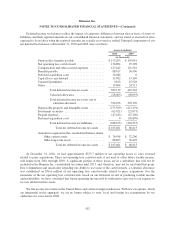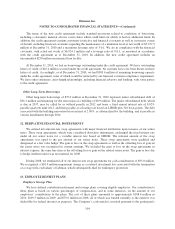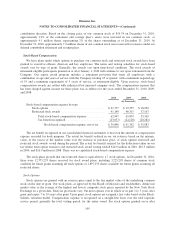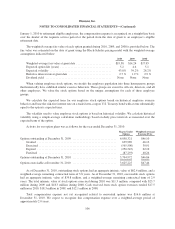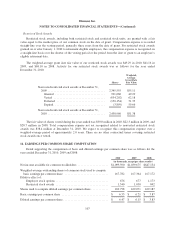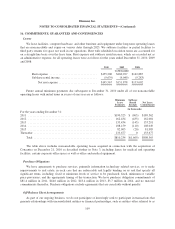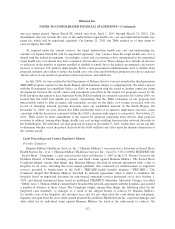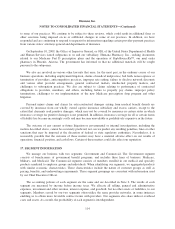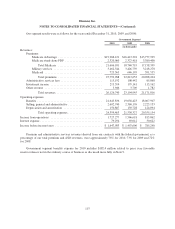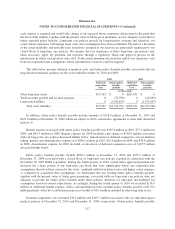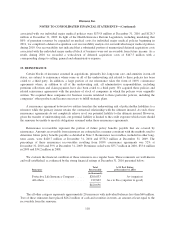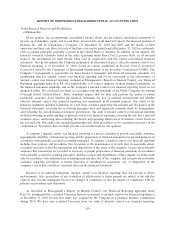Humana 2010 Annual Report Download - page 122
Download and view the complete annual report
Please find page 122 of the 2010 Humana annual report below. You can navigate through the pages in the report by either clicking on the pages listed below, or by using the keyword search tool below to find specific information within the annual report.Humana Inc.
NOTES TO CONSOLIDATED FINANCIAL STATEMENTS—(Continued)
one-year option period, Option Period IX (which runs from April 1, 2011 through March 31, 2012). The
Amendment does not include the costs of the underwritten target health care cost and underwritten health care
target fee, which will be negotiated separately. On January 21, 2011, the TMA notified us of their intent to
exercise Option Period IX.
As required under the current contract, the target underwritten health care cost and underwriting fee
amounts for Option Period IX will be negotiated separately. Any variance from the target health care cost is
shared with the federal government. Accordingly, events and circumstances not contemplated in the negotiated
target health care cost amount may have a material adverse effect on us. These changes may include an increase
or reduction in the number of persons enrolled or eligible to enroll due to the federal government’s decision to
increase or decrease U.S. military deployments. In the event government reimbursements were to decline from
projected amounts, any failure to reduce the health care costs associated with these programs may have a material
adverse effect on our results of operations, financial position, and cash flows.
In July 2009, we were notified by the Department of Defense that we were not awarded the third generation
TRICARE program contract for the South Region which had been subject to competing bids. We filed a protest
with the Government Accountability Office, or GAO, in connection with the award to another contractor citing
discrepancies between the award criteria and procedures prescribed in the request for proposals issued by the
DoD and those that appear to have been used by the DoD in making its contractor selection. In October 2009, we
learned that the GAO had upheld our protest, determining that the TMA evaluation of our proposal had
unreasonably failed to fully recognize and reasonably account for the likely cost savings associated with our
record of obtaining network provider discounts from our established network in the South Region. On
December 22, 2009, we were advised that TMA notified the GAO of its intent to implement corrective action
consistent with the discussion contained within the GAO’s decision with respect to our protest. On October 22,
2010, TMA issued its latest amendment to the request for proposal requesting from offerors final proposal
revisions to address, among other things, health care cost savings resulting from provider network discounts in
the South Region. We submitted our final proposal revisions on November 9, 2010. At this time, we are not able
to determine whether or not the protest decision by the GAO will have any effect upon the ultimate disposition of
the contract award.
Legal Proceedings and Certain Regulatory Matters
Provider Litigation
Humana Military Healthcare Services, Inc. (“Humana Military”) was named as a defendant in Sacred Heart
Health System, Inc., et al. v. Humana Military Healthcare Services Inc., Case No. 3:07-cv-00062 MCR/EMT (the
“Sacred Heart” Complaint), a class action lawsuit filed on February 5, 2007 in the U.S. District Court for the
Northern District of Florida asserting contract and fraud claims against Humana Military. The Sacred Heart
Complaint alleged, among other things, that, Humana Military breached its network agreements with a class of
hospitals in six states, including the seven named plaintiffs, that contracted for reimbursement of outpatient
services provided to beneficiaries of the DoD’s TRICARE health benefits program (“TRICARE”). The
Complaint alleged that Humana Military breached its network agreements when it failed to reimburse the
hospitals based on negotiated discounts for non-surgical outpatient services performed on or after October 1,
1999, and instead reimbursed them based on published CHAMPUS Maximum Allowable Charges (so-called
“CMAC rates”). Humana Military denied that it breached the network agreements with the hospitals and asserted
a number of defenses to these claims. The Complaint sought, among other things, the following relief for the
purported class members: (i) damages as a result of the alleged breach of contract by Humana Military,
(ii) taxable costs of the litigation, (iii) attorneys fees, and (iv) any other relief the court deems just and proper.
Separate and apart from the class relief, named plaintiff Sacred Heart Health System Inc. requested damages and
other relief for its individual claim against Humana Military for fraud in the inducement to contract. On
112


